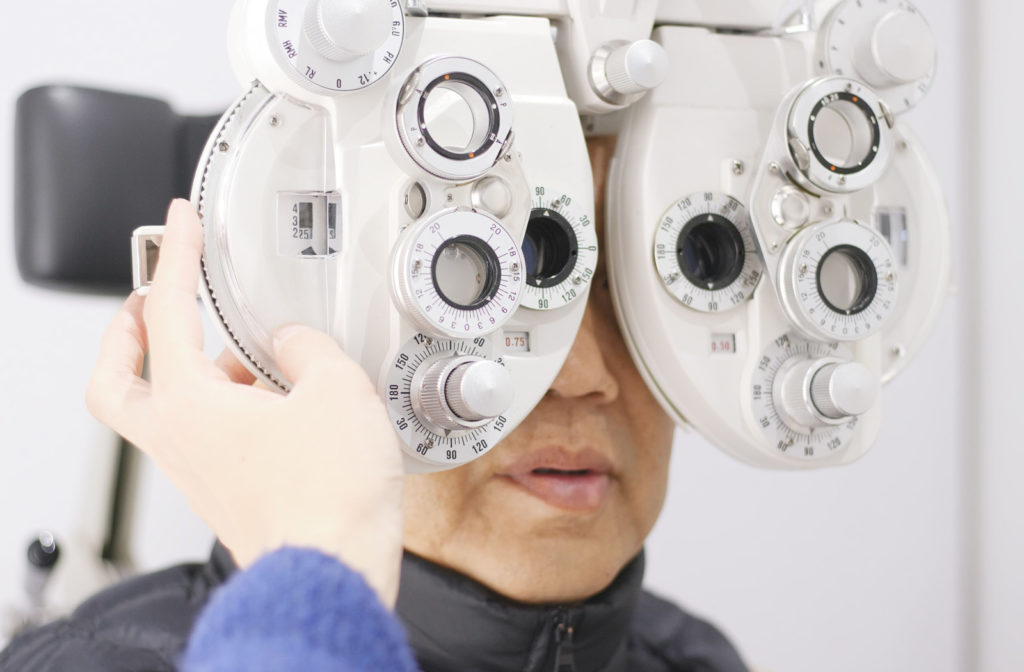Eye exams are a common experience when you’re younger, but they can start to feel unnecessary when you’re an adult. However, eye exams are important no matter your age, as they play a crucial role in managing your eye health.
Eye exams are necessary for protecting your vision, but how often do you need one?
According to the Canadian Association of Optometrists, adults without eye conditions should have an eye exam at least every 2 to 3 years between the ages of 20-40, and within 2 years between the ages of 40-65. Patients with an increased risk of eye conditions, like those with diabetes, should have an annual eye exam. After turning 65, patients should have a yearly eye exam to help identify potential eye problems as early as possible.
For the rest of your family, children should have a yearly eye exam until they’re 19. Their eyes can change as they grow, and annual eye exams can help identify potential issues.
Why Are Eye Exams Important?
Eye exams are important because they help your optometrist complete a comprehensive assessment of your vision and eye health. Your vision is more than how well you can see, and your eye doctor must assess all aspects of your eye health and vision.
During your eye exam, your optometrist can help diagnose eye diseases as early as possible, including:
- Glaucoma
- Cataracts
- Age-related macular degeneration
- Diabetic retinopathy
- Systemic health problems: such as diabetes, hypertension and even some cancers
After diagnosing an eye problem, your optometrist can recommend a customized treatment plan to address your symptoms.
What Can You Expect During Your Eye Exam?
Going for an eye exam is an important part of maintaining your eye health. During your exam, your optometrist and their team assess your eyes, including your vision, eye muscles, and the internal and external structures of the eye.
While your eye exam features many diagnostic tests, you can expect the following steps:
- Medical history: Your eye doctor will ask about your medical history, including your family history and lifestyle, to identify potential risks for your vision and eye health.
- Vision testing: Vision testing involves determining how well you can see and if you need corrective lenses.
- Imaging and diagnostics: Your optometrist will look at the eye’s internal structures using diagnostic equipment to help diagnose eye diseases and other problems.
10 Tips to Take Care of Your Vision

While eye exams are essential for your vision, caring for your eyes at home is just as important. Many lifestyle changes can help lower your risk of eye conditions and protect your eye health.
Here are 10 tips to help take care of your eye health and vision:
- Wear your glasses: Remember to wear your glasses if you need them. Many patients avoid wearing their lenses, but they’re essential for improving sight.
- Take care of your contact lenses: Contact lenses can be a great alternative to glasses but require more maintenance. If you’re using them, ensure you regularly clean and replace your lenses and follow proper hygiene.
- Wash your hands: Make sure you wash your hands before putting in contact lenses or any sort of touching around your eyes. Bacteria entering the eye can lead to a possible eye infection, like pink eye.
- Be safe when using digital devices: Focusing on digital devices like your laptop or phone for too long can lead to digital eye strain. Consider using the 20-20-20 rule when using your devices—take a 20-second break every 20 minutes to look at something at least 20 feet away.
- Eat a healthy diet: Your diet can impact your health, including your eyes. Eat a balanced diet filled with leafy greens, fish, and fruits to benefit your vision.
- Get enough exercise: Regular exercise can help keep your body at a healthy weight, reducing the chance of conditions that can later affect your eyes, like diabetes.
- Protect your eyes from the sun: Overexposure to the sun’s UV rays can increase your risk of several eye conditions. Investing in UV-blocking sunglasses can help protect your eyes.
- Wear eye protection when appropriate: Remember to protect your eyes if you regularly play sports, work with moving machinery, or other possible hazards. Lacking eye protection can increase your risk of a serious eye injury.
- Don’t ignore eye problems: It can be easy to brush off eye-related concerns, especially if you can see clearly. However, many eye conditions can lead to potential vision loss—always visit your optometrist if you experience symptoms of an eye problem.
- Book regular eye exams: You don’t need to only visit your optometrist if you’re experiencing problems. There are many serious, vision-threatening conditions that pose no outward symptoms. Book consistent eye exams so they can help identify changes in your vision or eye problems as early as possible.
Schedule Your Next Eye Exam
While every patient is different, you should see your eye doctor at least every couple of years. One of the most important things you can do for your vision is to have consistent eye exams. Your optometrist can help protect your eye health and vision. Contact LMC Optometry and Eye Care when it’s time for your next eye exam.



